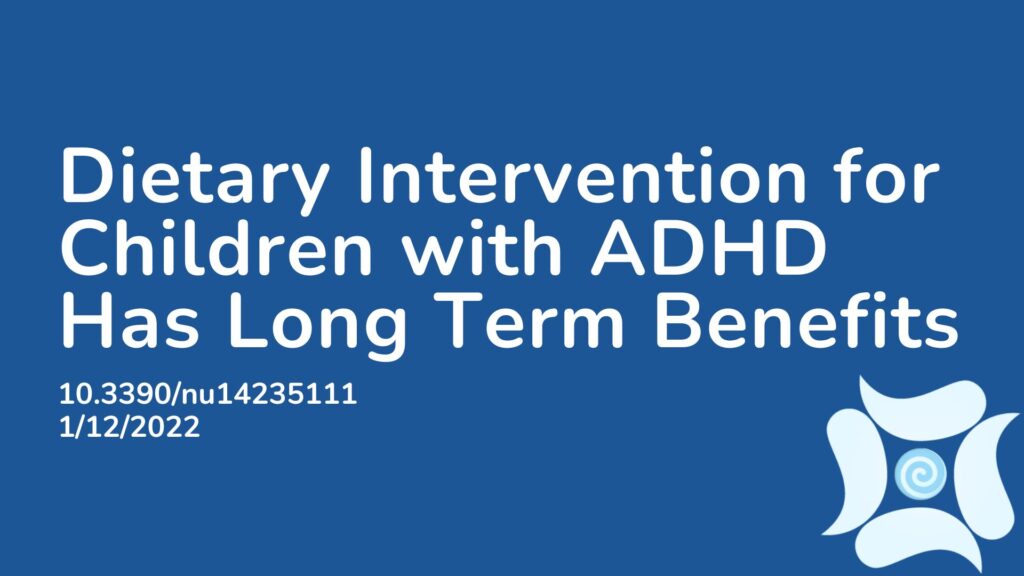Summary:
Attention-deficit/hyperactivity disorder (ADHD) affects up to 10% of children globally. Psychostimulants are the primary treatment for ADHD; however, these medications can cause adverse side effects such as sleep disturbances, loss of appetite, nausea, and more. ADHD’s pathophysiology involves various factors, including genetics, neurology, environmental factors, and food intolerances. Over a century ago, a study observed that food intolerances could increase restlessness and sleep disturbances in children. In 1961, Crook et al. supported this hypothesis. The role of the gut microbiome in ADHD has also been explored since then. In the early 1980s, Egger et al. proposed that certain foods might trigger behavioral problems and introduced the oligoantigenic diet (OD) for children. This diet avoids common allergens and includes hypoallergenic foods such as specific meats, healthy carbohydrates, fruits, vegetables, hydration, and vitamins. The diet is tailored to family preferences and excludes foods suspected of causing symptoms or those that the child particularly craves or dislikes. Egger’s study showed a symptom reduction in 82% of participants and normal behavior in 29% by the end of the diet. Other studies have shown that food intolerances can improve ADHD symptoms by about 40% in 60-80% of participants. This study is a follow-up analysis that replicated and confirmed the efficacy of the OD in children with ADHD, showing that individual food sensitivities significantly influenced symptom intensity. This study also aimed to determine the long-term success of the OD. ADHD symptoms in 21 children were assessed 3.5 years after they finished a 4-week OD. Fourteen of the 21 children showed improvement, while seven did not. At the follow-up, 28% of the children were on medication. The average symptom score improved significantly from 29.62 before the diet to 15.86 after the diet. At the follow-up, the average score was 16.00, still better than before the diet. This study showed that a personalized diet can greatly improve ADHD symptoms over the long term, suggesting that an oligoantigenic diet with personalized food recommendations could be an effective treatment option for children with ADHD.
Abstract:
In the early 1920s, it was discovered that nutrition is associated with what is known today as Attention-Deficit/Hyperactivity Disorder (ADHD) and that certain foods can worsen the symptoms. In previous studies, approximately 60% of the participants experience at least a 40% reduction in ADHD symptoms after an oligoantigenic diet (OD). The purpose of this study was to evaluate ADHD symptoms in children approximately 3.5 years after completing a 4-week oligoantigenic diet. Among 28 participants who completed the 4-week diet, 21 were re-assessed for this study after 3.5 years. The severity of ADHD symptoms was assessed with the ADHD-Rating-Scale-IV (ARS). Of 21 participants, 14 fulfilled the responder criterion, whereas 7 did not. At follow-up, 28% of the participants were taking medication. The mean ARS total score improved significantly from T1: M = 29.62 (SD = 9.80) to T2: M = 15.86 (SD = 8.56) between the time points before and after the diet (d = −1.91). There was also a lower ARS total score at the follow-up T5: M = 16.00 (SD = 10.52) compared to before the diet (d = −1.17). This study shows that individually adjusted nutrition significantly improved the ADHD symptomatology of the participants long-term. This suggests that an oligoantigenic diet with subsequent individual nutritional recommendations could become an additional treatment option for children with ADHD.
Article Publication Date: 1/12/2022
DOI: 10.3390/nu14235111



